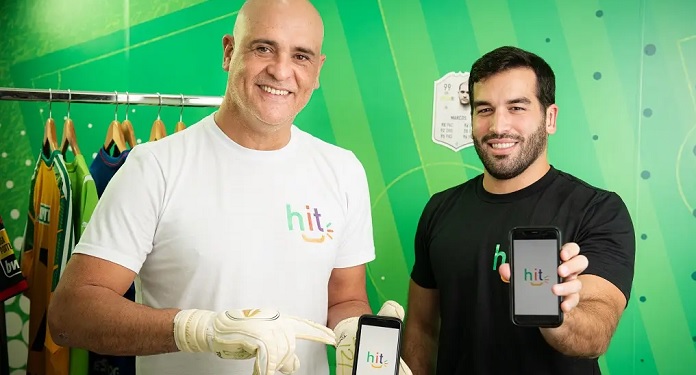A kind of pool of friends with technology. This is how Hit presents its service and aims to distance itself from competitors in the sportstech field. Therefore, she has a successful investor in the fields: Marcos, the goalkeeper ‘Santo’ of Palmeiras and five-time world champion with the Brazilian team in 2002.
In addition to Marcos, the group has Argentine Sorin, an idol at Cruzeiro, also as an investor in the startup led by Thiago Martins Machado, who founded Hit in early 2021, with an angel investment of R$3 million. The platform was launched earlier this year. According to the founder, the plan is to reach players who want to have fun betting on football, however, in a much more social and healthy setting.
The company’s platform has public betting groups, in which people can guess the results of football rounds in different tournaments, as well as creating customized groups and inviting friends.
The leagues range from “short-shot tournaments”, lasting from three days to a week, to long-term competition, such as the Brasileiro. “We seek to find a middle ground between the world of sportsbook, of betting sites, with fantasy sports, of sites like Cartola”, explained Thiago.
Simplified model
The idea for Hit came from a group of Thiago’s friends, from the period when they played on Cartola’s platform. A sports betting fan, Thiago discovered in his group of friends that, during the rounds, there was a reduction in engagement between players, due to the complexity of the dispute.
In the fantasy football game, it is necessary to scale your virtual team weekly, which can make the game work, according to him. At each round, it is necessary to reevaluate, study statistics and establish the desired team.
“In Hit, the bets are based on the guesses of the results. It’s something we created by looking at the profile of Brazilian and Latin American gamblers. What engages the most is the interaction and not so much the statistics”, explained Thiago.
It was precisely this simplified and more social model that caught Marcos’ attention. “What caught my attention the most is because it is a platform where people can have fun without having to spend a lot of money, really being a game where interaction is easy. You don’t need to be a data expert to have fun”, he says.
A different audience
When talking about the traditional betting model, from sites like Betfair and Sportingbet, Thiago is emphatic in saying that Hit brings something different. “I don’t like the model of betting against the house, in which the bottom line is always profit, addicting the user”, he says.
For the entrepreneur, the focus is for the public to have fun, so much so that his expectation of weekly ticket invested per user is around R$ 10. But then, in order to have revenue, the goal is to reach two million users by the end of 2022
“Now with the Brasileirão, we will intensify our digital presence to bring in new users, and with the World Cup at the end of the year, I believe we will further accelerate the growth of the base”, highlighted Thiago.
Another differential is the free public leagues, where users can join for free, competing for prizes ranging from R$100 to R$200. In paid public leagues, for example, the entry ticket is R$10, with prizes of up to 6,000.
For user-created leagues, Hit’s monetization model is by charging a commission on the “betting pool”, the amount of money that is put into the pool. According to the founder, the percentage varies from 5% to 25%, depending on the size of the group.
Game played
In fact, the national market is closely linked to sportstech games. On the eve of a regulatory change in the online gaming segment, bookmakers are expanding their presence and visibility to the public.
According to the website Marketing Esportivo, the amounts handled by this segment in Brazil grew from R$ 2 billion in 2018 to R$ 7 billion in 2020, with the potential to reach R$ 10 billion by 2023. Today, football has 70% of the bettors’ preference.
In fantasy football, Cartola is no longer a mere entertainment platform, earning other services with subscription tiers and user rewards. A competition is Rei do Pitaco, a group that received an investment of R$ 180 million. Launched in 2019, Rei do Pitaco recorded an increase of 600% last year and is betting heavily on advertising, counting on influencers for dissemination.
Founded by administrator Juliano Fontes and businessman Marcel Szajubok, Appost focuses on raising player awareness, giving results tips and tutorials for those who want to bet with more knowledge. Appraised at R$ 3 million, Appost has another partner known to sports fans: sports journalist Benjamin Back, also know as Benja.





















































